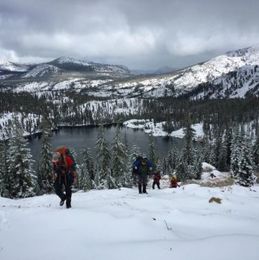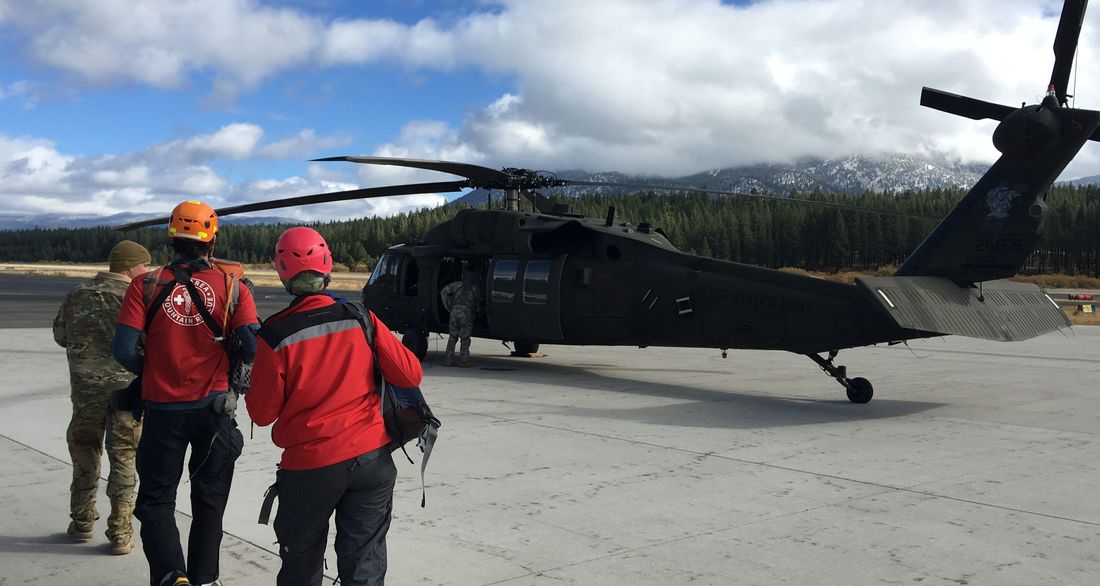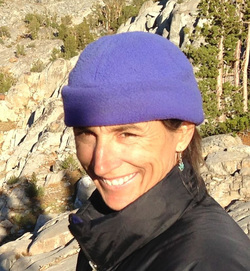
In a typical month I might shop at the grocery store ten times, go for a bike ride twelve times, blow a kiss to my son as he leaves for school twenty times, and bite my nails reading the news a hundred times (and yes, in these gloomy, Trump-infested days, my nails are wasted).
But usually I will also – at least once a month – try to save a person.
I’m on the Bay Area Mountain Rescue Unit, or BAMRU, one of twenty-five or so mountain search and rescue teams here in California. Just being part of search makes me feel better about the world, about divisive politics, about walls and bans and budgets because you know what? The whole point is there’s someone – anyone – out in the wilderness who’s gotten lost, or been hurt and can’t get to help, and they need to be found. It’s another human, simple as that. They can be (and have been) old or wealthy or conservative or parents or liberal or female or just a kid, maybe a mix of most of the above. Who cares? It is certainly not what we’re asking ourselves at daybreak in Command Post, high in the Sierra Nevada Mts., stamping our feet to keep warm, blowing on our fingers so we can write down details, listening hard at the briefing as the Incident Commander talks to the assembled searchers, usually twenty to thirty, sometimes as many as two hundred.
The search brings us all together. What we hear is Missing Person is <size> <age> wearing <something>. They’ve been lost since <day/time>. Maybe they suffer from <condition>. Maybe they have <equipmenttosurvive>. Maybe not. There’s no room for politics or socioeconomic status. And as the family or friend of the missing person steps into the middle of our circle, to thank us for searching, our hearts collectively reach out to them in empathy. I always tear up, dammit. I wish I wouldn’t, since it doesn’t help anyone. A lifelong friend tells us, in a dull monotone, how great a pilot the missing person is. Or...The elderly husband shakes his head in weary disbelief at his missing wife. Or... The adult kids, stricken and numb, with “Make America Great Again” emblazoned on sweatshirts, say something in trembling voices we can barely hear. I’m thankful for the tall shoulder of the searcher next to me that hides my wet face. This is always so hard. My own family suddenly feels so fragile, so vulnerable.
Our IC tells them we will do everything possible, then releases us searchers to grab equipment and deploy. The parking lot is suddenly alive with people do-si-do-ing around each other, relieved to have something to do. With action comes hope. That hope washes over the landscape like water let loose from a dam. It spills out of the parking lot and into snowmobiles, snow-cats, helicopters. Hope climbs onto skis and snowshoes. Like floodwater, it gets into everything. It spreads through the wilderness in methodical strategies, in hasty searches along trails and waterways, orthogonal grid searches through huge areas of probable terrain. Hope seeps into dense thickets, behind boulders, and cascades over cliffs as we look everywhere. It rends the air with our calls and whistles.
I want to capture that hope. I want to dump out the pretzels in my Zip-loc bag, shake out the crumbs, and scoop up hope. Bags and bags full. I want to bring it home and share it, dip my fingers in it as I read the paper. I want to offer it to the woman in a hajib standing next to me in the airport, wringing her hands after a long hug with her daughter, watching her disappear past security. Here, have some hope. I want enough for the friend who just learned that her brother finally escaped the bloodbath of El Salvador, made it over the U.S. border, and got to the relative safety of a detention center near Houston. Here, some hope he find his way to you soon. Or the neighbor of my Mom, who was deported to Mexico after working in the U.S. for 16 years, forced to leave her naturalized children behind. Take this with you. Take the whole damn bag.
I want to open that Zip-loc and empty it into all of our streets and schools and hospitals and homes. Because being lost isn't a choice we make. Sometimes we lose our way and sometimes something insurmountable gets between us and home. But what we all have in common, what makes us more like each other than different, is that no matter what we call home, we want to be able to get there.
But usually I will also – at least once a month – try to save a person.
I’m on the Bay Area Mountain Rescue Unit, or BAMRU, one of twenty-five or so mountain search and rescue teams here in California. Just being part of search makes me feel better about the world, about divisive politics, about walls and bans and budgets because you know what? The whole point is there’s someone – anyone – out in the wilderness who’s gotten lost, or been hurt and can’t get to help, and they need to be found. It’s another human, simple as that. They can be (and have been) old or wealthy or conservative or parents or liberal or female or just a kid, maybe a mix of most of the above. Who cares? It is certainly not what we’re asking ourselves at daybreak in Command Post, high in the Sierra Nevada Mts., stamping our feet to keep warm, blowing on our fingers so we can write down details, listening hard at the briefing as the Incident Commander talks to the assembled searchers, usually twenty to thirty, sometimes as many as two hundred.
The search brings us all together. What we hear is Missing Person is <size> <age> wearing <something>. They’ve been lost since <day/time>. Maybe they suffer from <condition>. Maybe they have <equipmenttosurvive>. Maybe not. There’s no room for politics or socioeconomic status. And as the family or friend of the missing person steps into the middle of our circle, to thank us for searching, our hearts collectively reach out to them in empathy. I always tear up, dammit. I wish I wouldn’t, since it doesn’t help anyone. A lifelong friend tells us, in a dull monotone, how great a pilot the missing person is. Or...The elderly husband shakes his head in weary disbelief at his missing wife. Or... The adult kids, stricken and numb, with “Make America Great Again” emblazoned on sweatshirts, say something in trembling voices we can barely hear. I’m thankful for the tall shoulder of the searcher next to me that hides my wet face. This is always so hard. My own family suddenly feels so fragile, so vulnerable.
Our IC tells them we will do everything possible, then releases us searchers to grab equipment and deploy. The parking lot is suddenly alive with people do-si-do-ing around each other, relieved to have something to do. With action comes hope. That hope washes over the landscape like water let loose from a dam. It spills out of the parking lot and into snowmobiles, snow-cats, helicopters. Hope climbs onto skis and snowshoes. Like floodwater, it gets into everything. It spreads through the wilderness in methodical strategies, in hasty searches along trails and waterways, orthogonal grid searches through huge areas of probable terrain. Hope seeps into dense thickets, behind boulders, and cascades over cliffs as we look everywhere. It rends the air with our calls and whistles.
I want to capture that hope. I want to dump out the pretzels in my Zip-loc bag, shake out the crumbs, and scoop up hope. Bags and bags full. I want to bring it home and share it, dip my fingers in it as I read the paper. I want to offer it to the woman in a hajib standing next to me in the airport, wringing her hands after a long hug with her daughter, watching her disappear past security. Here, have some hope. I want enough for the friend who just learned that her brother finally escaped the bloodbath of El Salvador, made it over the U.S. border, and got to the relative safety of a detention center near Houston. Here, some hope he find his way to you soon. Or the neighbor of my Mom, who was deported to Mexico after working in the U.S. for 16 years, forced to leave her naturalized children behind. Take this with you. Take the whole damn bag.
I want to open that Zip-loc and empty it into all of our streets and schools and hospitals and homes. Because being lost isn't a choice we make. Sometimes we lose our way and sometimes something insurmountable gets between us and home. But what we all have in common, what makes us more like each other than different, is that no matter what we call home, we want to be able to get there.

